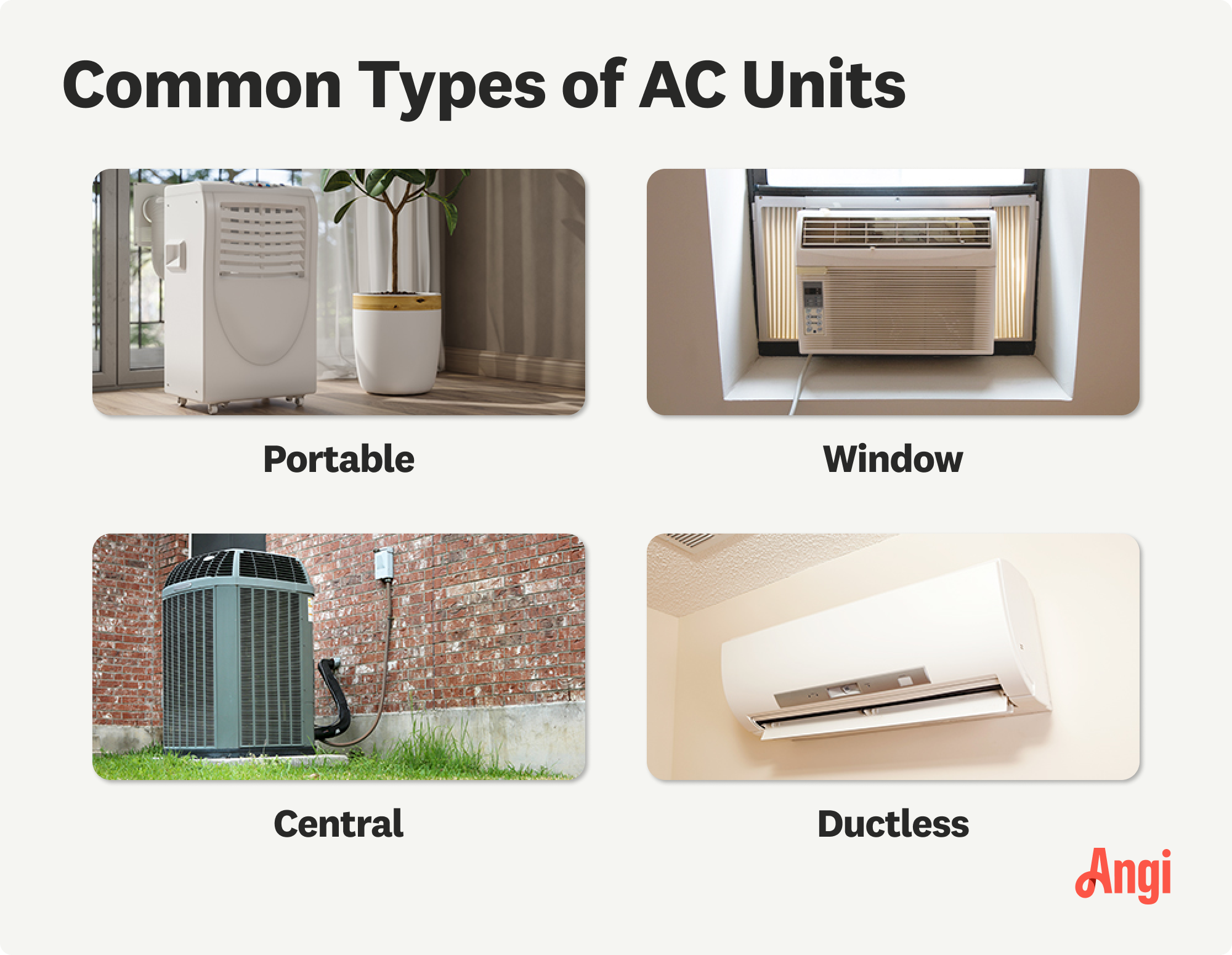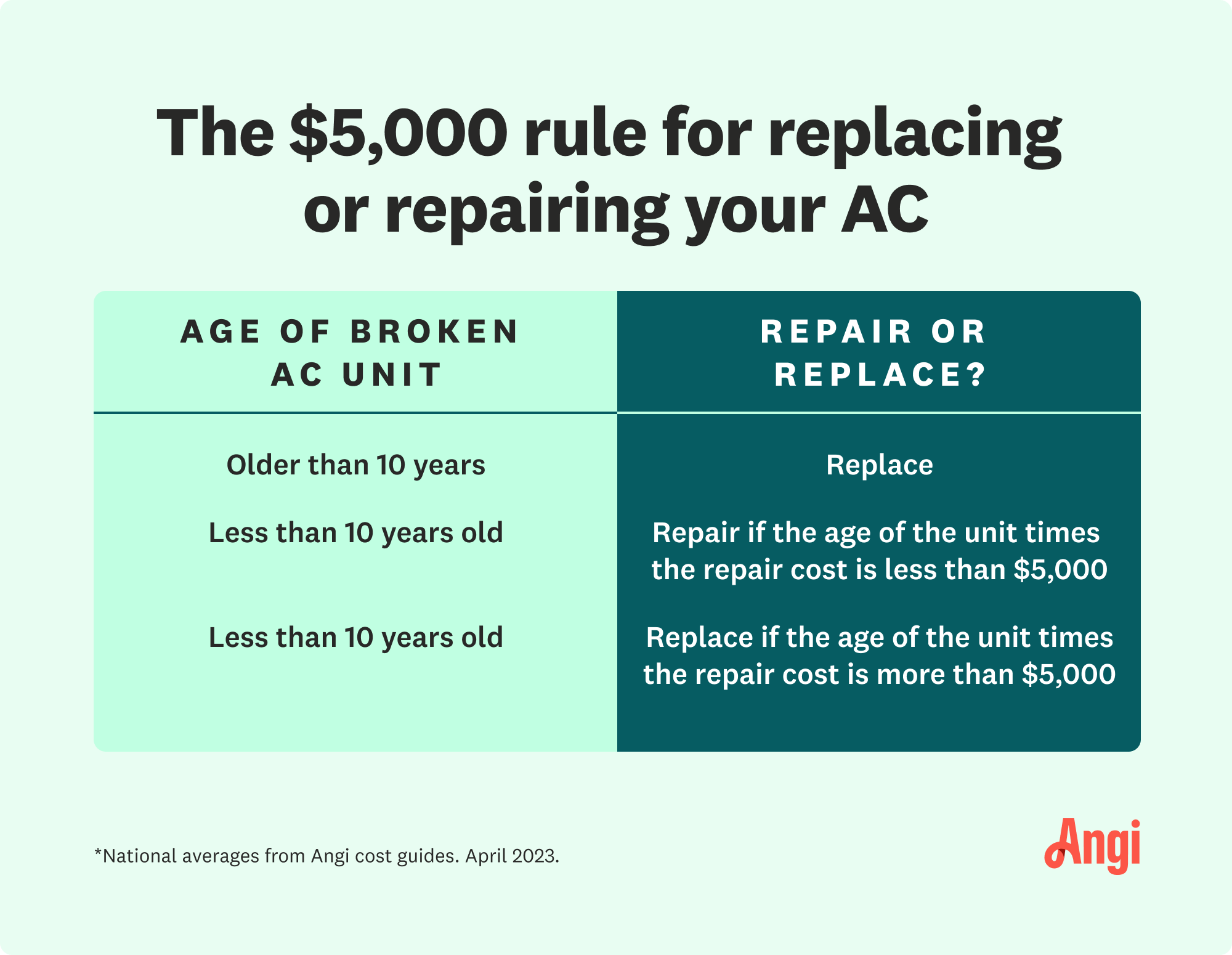
What you’ll pay for furnace repairs depends on many factors, including what parts are malfunctioning, where you live, and even the time of day. Here’s a breakdown of what can go wrong with your furnace and the cost to fix those issues.
The average AC replacement cost in Chicago, Illinois, is $4,103, but it’s common to pay between $2,748 and $5,472 for this type of work. An AC pro can provide an accurate quote based on the unit’s type, size, and other factors.


Chicago’s combined sales tax rate is 10.25%, which increases the cost of your air conditioner.
Since Chicago has warm and humid summers, upgrading your AC unit can boost your home’s resale value.
Permits for AC work are required in Chicago, so your pro will have to pull a permit before starting work, which adds to the costs.
On average, you’ll spend $4,103 on AC replacement costs in Chicago, Illinois. However, costs depend on the type and size of the AC unit, as well as its efficiency rating. For that reason, the total price of this project often ranges from $2,748 to $5,472.
It’s a big investment, but for many homeowners, it’s well worth the expense to keep cool through the Windy City’s hot and humid summers. Here’s how to budget for this type of work.
The price you pay for AC replacement will depend on your AC unit’s type, size, and other factors. Here’s what to consider when budgeting for air conditioner replacement in Chicago.

There are many different kinds of air conditioners, which range significantly in price. The type you choose has a big impact on the overall cost of this project.
Portable AC units start around $100 and are useful if you live in an apartment or an older-style Chicago home (like a worker’s cottage or bungalow) without ductwork. If you’re replacing your central AC, you’ll pay much more—up to $4,500 for the unit alone.
| AC Type | Average Unit Cost | Pros | Cons |
|---|---|---|---|
| Portable unit | $100–$500 | Low-cost and able to move between rooms | Noisy and only works in one room at a time |
| Window unit | $150–$800 | Cost-effective and suitable for small areas | Needs a dedicated window and not effective for whole-house cooling |
| Ductless split system | $2,000–$3,000 | Lets you create cooling zones without ductwork | Limited to individual rooms |
| Central | $2,500–$4,500 | Can cool your entire house | Costly installation and requires ductwork |

Air conditioners also come in various sizes. In this context, “size” doesn’t refer to the physical dimensions of the unit but its cooling capacity, which is measured in tons or British Thermal Units (BTUs). The most powerful AC units are also the most expensive.
BTU, or British Thermal Unit, is a unit that measures how much energy it takes to raise the temperature of one pound of water by one degree Fahrenheit. For heat pumps, each ton of capacity is equivalent to roughly 12,000 BTUs.
Calculating the right AC size for your home can get complicated, so it’s best to contact an AC installer in Chicago, Illinois, if you aren’t sure which size is best.
| AC Tonnage | BTUs | Average Unit Cost |
|---|---|---|
| 1.5 | 18,000 | $1,300–$4,000 |
| 2 | 24,000 | $1,500–$5,000 |
| 3 | 36,000 | $2,000–$5,500 |
| 4 | 48,000 | $2,600–$6,200 |
| 5 | 60,000 | $2,800–$6,800 |
Your air conditioner’s efficiency—which is measured by its Seasonal Energy Efficiency Ratio (SEER) or SEER2 rating—is another cost factor for this project. The higher the SEER or SEER2 rating, the pricier the AC unit is. However, more efficient AC units can save you some money over time, thanks to their decreased energy consumption.
When buying a new AC unit in Chicago, it must have a minimum 14 SEER rating (or 13.4 SEER2) to meet the region’s HVAC efficiency standards.
If your AC unit and ductwork are hard to access, you could pay more for labor. For example, if part of your system is tucked away in a cramped utility space beneath your Chicago Greystone, it will be difficult for your contractor to reach—and they may charge a higher rate.

Preparing to hire someone to replace your AC in Chicago? Here’s what you should know.
To replace an AC unit in Chicago, you’ll need a permit from the city. You or your contractor can use the Express Permit Program to request the permit and check the application status. If you submit the permit request, your contractor will get an email notification and must accept the job before the permit is granted.
There’s no HVAC licensing requirement in Chicago or Illinois. However, technicians who handle refrigerants in Chicago (and the rest of the country) must be certified by the Environmental Protection Agency (EPA).
When searching for an AC installer in Chicago, look for professionals who are certified by North American Technician Excellence (NATE). To receive a NATE certification, the technician must have two years of HVAC experience and pass several rigorous exams.
Materials and supplies purchased in Chicago are subject to the city’s combined sales tax rate of 10.25%. This means that if you buy a $4,000 central AC unit, you’ll pay an additional $410 in sales tax.
There’s no expectation to tip your HVAC technicians in Chicago, but it’s a thoughtful gesture. However, you should confirm the company’s tipping policy beforehand because some don’t allow their employees to receive tips.

A brand-new AC unit is definitely a selling point in Chicago, where summers tend to be warm and muggy. High-efficiency units (with a SEER rating of 15 or 16) are even more attractive to buyers since they require less energy to cool the home.
With that said, while it’s nice to have air conditioning in Chicago, it’s arguably more important to have reliable heating for the frigid winters. So, if you’re going through the effort of installing a new AC unit, it may also be worth upgrading other parts of your HVAC system, including your heat pump or furnace. These types of HVAC improvements raise your home’s value by 5% to 7%.
Home is the most important place on earth, which is why Angi has helped more than 150 million homeowners transform their houses into homes they adore. To help homeowners with their next project, Angi provides readers with the most accurate cost data and upholds strict editorial standards. We survey real Angi customers about their project costs to develop the pricing data you see, so you can make the best decisions for you and your home. We pair this data with research from reputable sources, including the U.S. Bureau of Labor Statistics, academic journals, market studies, and interviews with industry experts—all to ensure our prices reflect real-world projects.
Want to help us improve our cost data? Send us a recent project quote to [email protected]. Quotes and personal information will not be shared publicly.
From average costs to expert advice, get all the answers you need to get your job done.

What you’ll pay for furnace repairs depends on many factors, including what parts are malfunctioning, where you live, and even the time of day. Here’s a breakdown of what can go wrong with your furnace and the cost to fix those issues.

Ductless heating and cooling system costs vary depending on size, type, and energy efficiency. Their installation is likely to lower your energy bills.

Exposed ductwork can be a smart choice even beyond aesthetics. Fortunately, exposed ductwork costs are relatively low, and easy access keeps repair costs to a minimum.

With so many types of furnaces out there, how do you know which one is best for you? Explore our guide to the five main types and get your home warmed up.

Your return air vent is responsible for removing warmer air, so testing it ensures you keep your environment comfortable and there are no HVAC problems.

Baseboard heater covers can endure a lot of wear and tear, but eventually you’ll want to replace them. Here’s the best way to switch out baseboard heater covers.